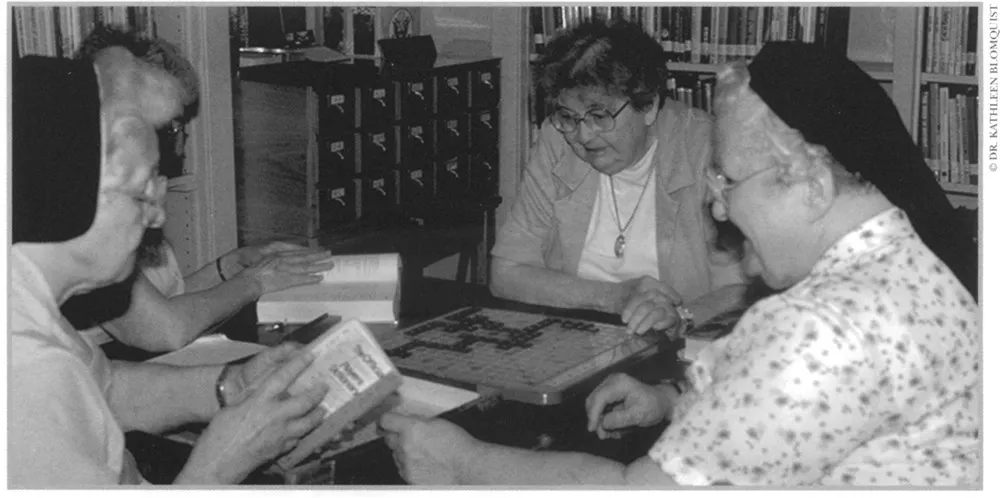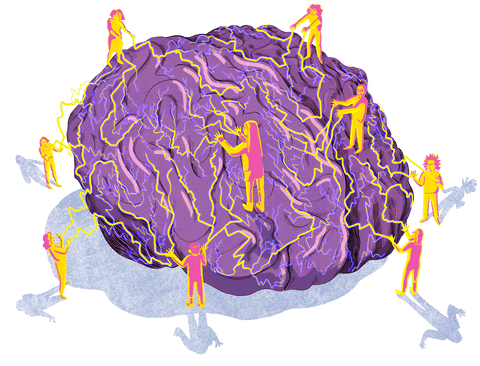Every time you listen, speak, read, and write, you are "massaging" your brain
You can’t speak fluently, your ears don’t work well, you can’t name things when you see things… When did you realize that you were suddenly “old”?

In the book “Changing Minds: How Aging Affects Language and How Language Affects Aging”, University of Memphis psychology professors Roger Cruz and Dr. Richard Roberts mentioned that aging is a two-way process, time plays a decisive role, but human intervention is Also important.
Through the learning and use of language, people can influence the cognitive aging process, promote brain health, and even prolong life and improve the quality of life.
The more language you use, the better your brain becomes
“Language is a very important part of cognitive function.” Cognitive function is a person’s ability to understand the external world, including memory, calculation, execution, attention, language, and orientation (including space, time, and character relationships). ).
Listening, speaking, reading and writing protect cognitive function
Clinically, some dementia patients do not have problems with memory, but have language barriers.
For example, the naming disorder, that is, the patient knows that the cup is used for drinking water, but cannot call the name; and the patient’s language expression is confusing, not fluent, and it is difficult to say a complete sentence. Language training for these patients can play a certain role. improve.
That is to say, the training of listening, speaking, reading, and writing has a certain protective effect on cognitive function. The famous “Nun Study” in the United States found that an individual’s early language ability may be related to the risk of Alzheimer’s disease.

The nuns participating in the study are playing a competitive scrabble game
The more developed the language function in the early years, the deeper the depth of thought logic, the better the cognitive function will be maintained in the later years, and the lower the risk of developing Alzheimer’s disease.
Brains ‘get smaller’ from age 40
Human brain development generally peaks between the ages of 20 and 40. From the age of 40, the number of nerve cells (neurons) in the brain gradually decreases, which affects memory, coordination, and brain function, and the size of the brain gradually shrinks.

From a physiological point of view, people’s memory, reaction ability and executive ability will irreversibly decline with age, but language ability does not age with the body, on the contrary, the more it is used, the more developed it is.
Many examples of “late bloomers” show that age does not impair people’s ability to speak, write, and learn new vocabulary, and even the ability to understand, use, and create language develops well in old age.
For example, Canadian female writer Alice Munro wrote her first novel at the age of 37 and won the Nobel Prize for Literature at the age of 82; British writer Daniel Defoe did not publish her first novel “Lu “Binson Crusoe”; Shandong writer Jiang Shumei began to learn and read at the age of 60, published her first book at the age of 74, and then published 5 works in seven or eight years…
How Listening, Reading, Writing, and Writing Affect Brain Health
Listening, speaking, reading, writing, and reading accompany people throughout their lives, which not only affects people’s cognition and personality, but also affects their brain health.
Listening: Strengthening Cognitive Resilience
One of the most obvious signs of physical aging is hearing loss. ENT experts at Johns Hopkins University in the United States have found that people with hearing loss have an accelerated decline of 30% to 40% in hearing and cognitive abilities.

Hearing is an important channel for language input to the brain. The reasons for the accelerated impairment of cognitive function due to hearing loss may include:
Diseases that cause hearing deterioration can also impair cognition; hearing loss reduces stimulation of key areas of the brain, accelerating neurodegeneration; hearing loss affects information acquisition and depletes cognitive reserves.
A study published in the American Journal of Medicine found that as long as someone listens when speaking, the brain is more cognitively resilient. 4 years.
Speaking: Exercise brain flexibility
Talking is a benign stimulus to the brain and helps keep it alive.
If a person lives in isolation and no one speaks and communicates, not only will the ability to speak slowly deteriorate, but also loneliness and social isolation will occur, thereby reducing cognitive function.

Clinically, some dementia patients also have problems with speaking ability, such as poor expression, difficulty in finding words, and difficulty in naming. Among them, the difficulty of finding words is a typical cognitive impairment problem, and suddenly cannot remember familiar things, names, but also proper nouns and object names.
Studies have shown that when a person reads instructions aloud, they tend to focus better and perform better than those who read them silently. If you need to remember a lot of information, especially in writing, reading aloud is the best way to do it.
Reading: Boost your brainpower
When reading, the brain must coordinate numerous perceptual and cognitive functions, including basic visual skills, phonological perception, long-term memory, and working memory.
When reading, in addition to paying attention to the current information points (story background, characters, details, etc.), you should also connect with the content you read before.

There are hundreds of millions of information points in each book, and the brain needs to continuously remember this information and store it, which ultimately enhances memory.
Brain scans of people with an average age of 76 at the University of California, Berkeley, found that reading at an early age can prevent Alzheimer’s disease.
According to a study by the Rush University Medical Center in the United States, the elderly who regularly read and read newspapers have a 32% lower risk of mental decline than the general population.
A large-scale study led by the Yale School of Public Health found that people who read at least 30 minutes a day lived nearly two years longer on average than those who didn’t.
It should also be reminded that the carrier of this reading is a paper book, not an e-ink product.
Write: Strengthen memory
Writing activates the motor, visual and cognitive areas of the brain.
“Writing not only mobilizes cognition, but also the motor function of the body.” Shen Lu said that writing is the strengthening of memory. In the process of choosing words and sentences, both the mind and the body are well exercised.

Gerontologists at Utah State University found that people who kept a diary throughout their lives had a 53 percent lower risk of developing cognitive impairment.
It should be noted that the four dimensions of language listening, speaking, reading, and writing can operate relatively independently. For example, a stroke patient may lose the ability to read, but not necessarily the ability to understand language and speak, and even continue to write.
Language ability “uses it and loses it” will also decline in the normal aging process, but maintaining and exercising language ability can optimize cognitive function and fight to age.
5 small things to exercise language function
Like physical exercise, language exercise should also be adhered to, especially for the elderly. Experts recommend starting from the following points.
Keep listening
When hearing loss occurs, you should seek medical attention or get hearing aids in time; listen to soothing and familiar music or stories from your youth to awaken pleasant memories.
Research from institutions such as the University of Toronto confirms that repeated listening to meaningful music produces beneficial brain plasticity in mild cognitive impairment or early Alzheimer’s disease.

Actively communicate
The elderly should communicate more with their family members in their lives. For example, after watching TV and discussing the plot with their family members, they can not only exercise memory, but also enhance their feelings.
Participate in more social activities, such as speech contests, etc., to exercise language skills; maintain healthy social interactions, and refuse bad social behaviors such as gambling and alcoholism.
Keep reading
It is recommended that the elderly read more books and newspapers, at least 3 to 5 days a week, and read at least 30 minutes a day, which can not only help memorize words and knowledge, but also understand the latest information, so as not to be out of touch with society.
The material to be read should be scientific and slightly challenging, to mobilize the elderly’s thinking or learn new knowledge.

Develop the habit of writing
Cultivate the habit of writing a diary, copying poems or words of interest, not only to exercise writing ability, but also to exercise work and motor functions.
The elderly can also read the written diary regularly to evoke memories and exercise memory function. Anxiety and depression patients usually write more, which can also reduce the symptoms of emotional tension.
Try to learn a new language
A new study from New York University shows that in addition to enhancing cognition, learning a second language can also broaden your horizons and add joy to life.
Experts remind that the decline in listening, speaking, reading, and writing skills often indicate cognitive dysfunction, and every change in function may be a signal of some diseases:
- The language fluency is decreased, and the language fluency test can be used for self-examination.
Say the names of fruits, vegetables, or animals as much as possible within 1 minute, 14 with a college degree or above are considered qualified; 12 with a high school degree; 11 with a junior high school degree; and 10 with a primary school degree or below.
Difficulty finding words, unable to understand other people’s speech, such as watching TV and unable to keep up with the plot.
The speech is simple and repeated. After the next sentence is finished, you do not know what the previous sentence is saying.
Difficulty in writing or reading, unable to write complex characters, unable to read newspapers.
Once the above situation occurs, you should pay attention to it and see a memory clinic or a cognitive specialist.